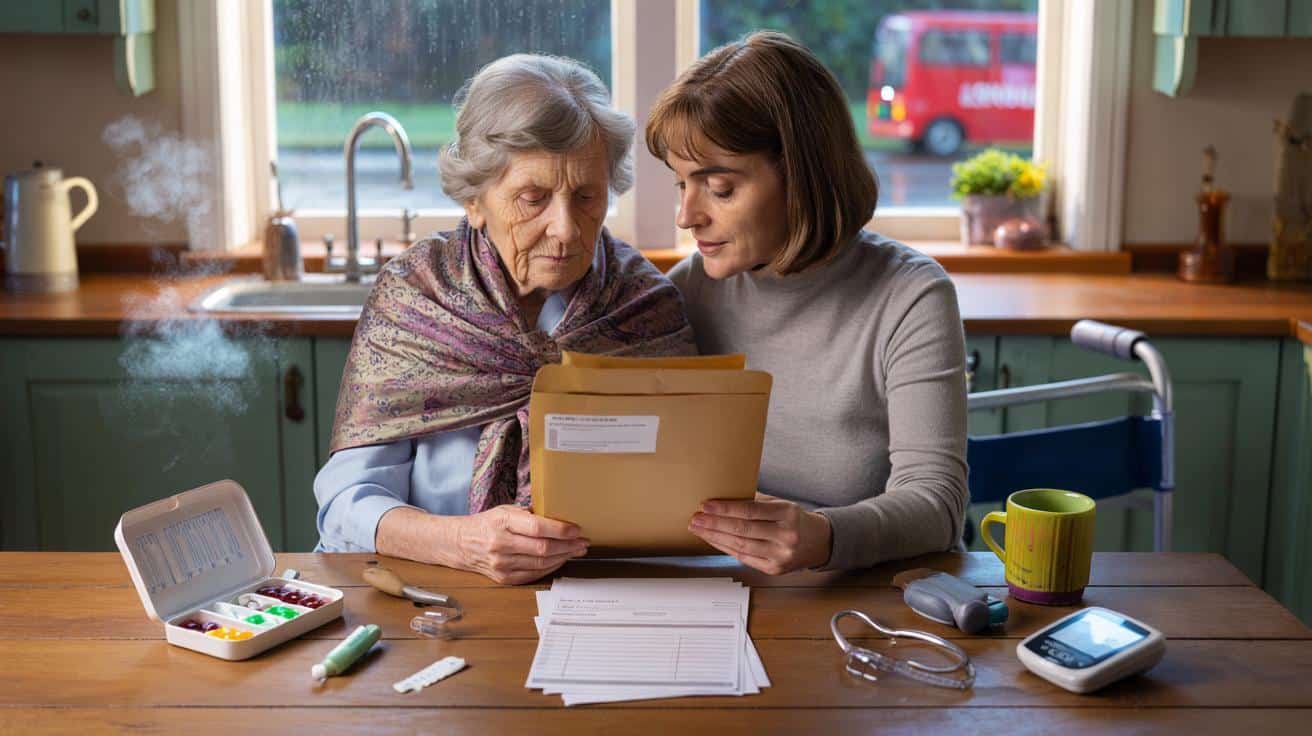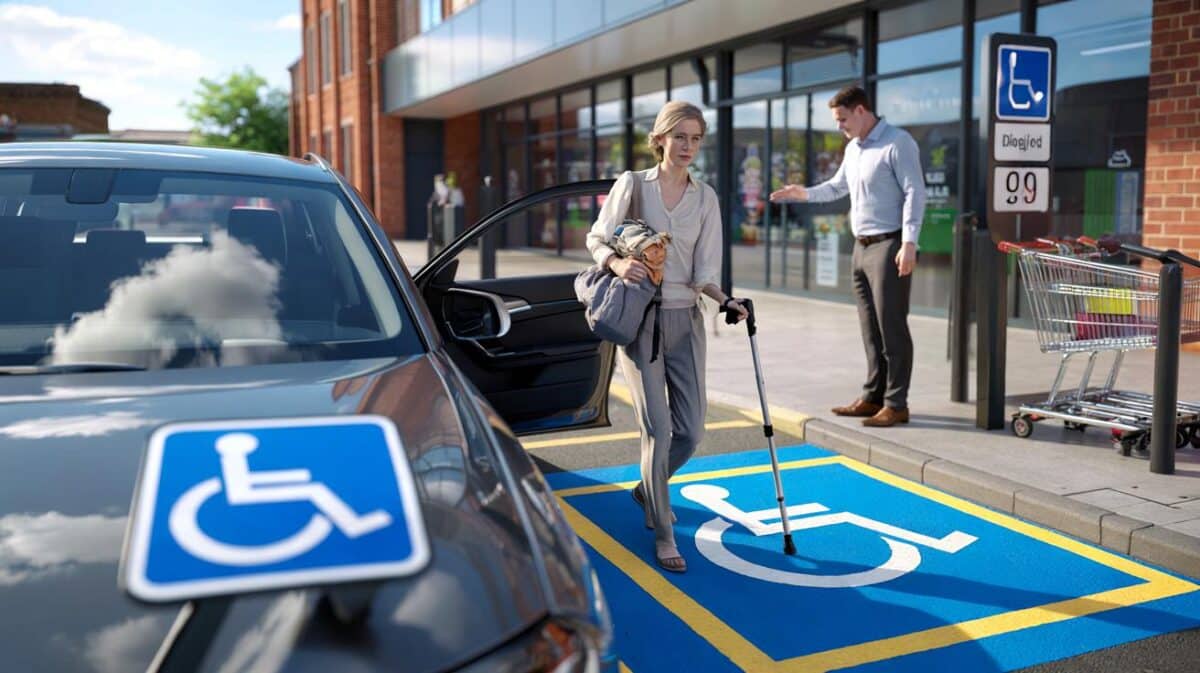Across the UK, thousands of people live with conditions that sap energy, slow movement, or steal memory — and many don’t realise the **DWP** will pay around **£110 a week** to help. This isn’t charity; it’s a right tied to the support you need day to day.
I met Jean on a Tuesday, the kind of damp afternoon that makes joints ache more than usual. She was wrapping a scarf twice round her neck as if it might hold her steady. Her daughter hovered nearby, discreetly counting the steps to the bus stop because stairs had become a small negotiation with gravity. Jean apologised for moving slowly, as if slowness was an inconvenience for everyone else. *It stuck with me.*
She told me she’d never claimed a penny. “I’ve always managed,” she said, even though making a cup of tea involved a stool, two breaks and a shake that spilled sugar like snow. On a shelf sat a neatly folded stack of forms. Blank. “I don’t want to make a fuss,” she added, like thousands of others who don’t want to be a burden. The truth? There’s a benefit built for this exact situation. And it’s hiding in plain sight.
DWP £110 a week: who really gets it — and why so many don’t
The money in question is **Attendance Allowance**. It’s for people over State Pension age who need help with personal care or supervision to stay safe. Think washing, dressing, taking meds, getting to the loo, preparing food, staying safe if you’re unsteady or forgetful. It’s not about your diagnosis on paper; it’s about what your condition does to your day.
We’ve all had that moment when pride whispers louder than pain. Charities say many older people miss out because they underestimate their needs, minimise “bad days”, or assume others deserve support more. I hear stories like Jean’s every week: intelligent, capable adults quietly adapting — eating cold meals to avoid lifting pans, skipping baths because climbing out is risky, or wearing the same cardigan because buttons fight back. These aren’t small things. They’re care needs.
Here’s the line that matters: the DWP decides on the help you need, not just the condition you have. Two people with arthritis can have wildly different care needs. That’s why the benefit is split into two rates — lower and higher — with the top rate currently worth around £108.55 a week. Call it “about £110” and you won’t be wrong. You don’t need a carer living with you. You don’t even need a formal diagnosis for some conditions. You just need to show what help you require in real life.
How to claim without tripping up: the method that works in practice
Start by getting a date-stamped claim. Ring the Attendance Allowance helpline and ask for the form to be posted; your claim is treated as starting from that call if you return it on time. Prefer online? You can download form AA1, but calling secures that earlier start date. Keep a “typical week” note for seven days: where you need help or supervision, how long tasks take, what goes wrong, and how pain or fatigue hits later.
On the form, write about worst days as well as better ones. If you can wash, but only with a seat, extra time, and help for your back, say so. If you need reminding to take tablets, explain the system that makes it work. List aids you rely on — perching stool, grab rails, shower chair, dosette box, incontinence pads — and say why they’re essential. Let’s be honest: nobody does that every day. But if you often do, or you’d be unsafe without support, it counts.
Common snags? People downplay risks, skip “embarrassing” details, or write about what they once could do, not what today looks like. They forget the aftermath — pain, breathlessness, shaking, confusion — that follows effort. Be kind to your past self, but write for the version of you that lives now. A benefits adviser in Leeds put it bluntly:
“Describe the help you need on a bad day, then show how often those bad days happen. If it takes twice as long, needs prompting, or isn’t safe solo, that’s care.”
- Osteoarthritis
- Rheumatoid arthritis
- Osteoporosis
- Back pain and spondylosis (including sciatica)
- Polymyalgia rheumatica
- Gout
- Parkinson’s disease
- Multiple sclerosis (MS)
- Motor neurone disease (MND)
- Stroke after-effects
- Epilepsy
- Peripheral neuropathy
- Essential tremor
- Cerebral palsy
- Huntington’s disease
- Ataxia
- Dystonia
- Chronic obstructive pulmonary disease (COPD)
- Severe asthma
- Pulmonary fibrosis
- Sleep apnoea with daytime care needs
- Heart failure
- Ischaemic heart disease/angina
- Peripheral vascular disease
- Postural hypotension and fainting
- Diabetes with complications
- Inflammatory bowel disease (Crohn’s/ulcerative colitis)
- Stoma care (colostomy/ileostomy)
- Chronic liver disease
- Chronic kidney disease (stage 4–5)
- Cancer (including under Special Rules)
- Severe sight loss (registered blind)
- Severe hearing loss
- Deafblindness
- Alzheimer’s disease
- Vascular dementia
- Dementia with Lewy bodies
- Depression (severe, enduring)
- Anxiety disorders with daily support needs
- Bipolar disorder
- Schizophrenia or psychosis
- Systemic lupus erythematosus (SLE)
- Psoriatic arthritis
- ME/CFS
- Long COVID with ongoing care needs
- Frailty of old age
- Incontinence and continence care
- Dysphagia (swallowing difficulties)
The list is real — and so are the lives behind it
Every item above shows up in DWP data and casework because it often creates care needs. A label alone doesn’t guarantee a penny, and not having one doesn’t shut the door. What matters is the help you need “often enough” — frequent or prolonged — and the risk if no one’s there. If you’re living with falls, confusion, breathlessness, tremors, pain that changes how you wash, dress, eat, or take meds, that’s the heart of the test.
There’s no mobility component with Attendance Allowance, and it isn’t means-tested. Getting it can unlock extra help — higher Pension Credit, Housing Benefit, Council Tax Reduction — and it can allow someone who cares for you to claim Carer’s Allowance. That £110 a week isn’t a windfall; it’s fuel. It pays for taxis to the GP, a hot meal delivered, a bit of cleaning, a handrail fitted before the next fall.
If you’re hesitating, think of the moment in the day you avoid. The bath you put off. The morning you dread because your hands won’t close round buttons. The kettle that feels like a weight. You are not “making a fuss” by applying. You’re describing reality so a system designed to help can do its job. And maybe someone you love needs to read this out loud and say, softly: “Let’s try.”
| Key point | Detail | Interest for readers |
|---|---|---|
| Who it’s for | People over State Pension age needing personal care or supervision due to a health condition | Clear target group: many readers will recognise themselves or a parent |
| What it pays | Two rates, with the higher rate around £108.55 a week in 2024/25 | Sets expectations and shows why claiming matters |
| How to claim | Call for a date-stamped form; describe bad days, risks, time taken, and aids used | Practical steps that move readers from reading to doing |
FAQ :
- Does a diagnosis automatically qualify me?No. The DWP looks at how your condition affects daily living and safety. The diagnosis supports your story, but your care needs decide the rate.
- Is Attendance Allowance means-tested?No. Savings and income don’t reduce it. It doesn’t count as taxable income either.
- Do I need a carer to qualify?No. You can live alone and still get Attendance Allowance. It’s about the help you need, whether or not you actually receive it.
- When does payment start?If you call for the form, your claim can be backdated to that call when you return it on time. Otherwise it usually starts from the date the DWP receives your form.
- What if my condition is terminal?Under Special Rules, claims are fast-tracked and paid at the higher rate. A clinician completes form SR1 to confirm your situation.









